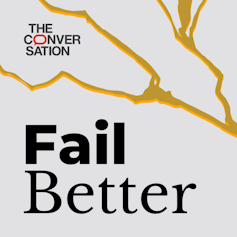Failure may be an inevitable part of life, but that doesn’t make it any less painful when it does happen. It can be particularly hard facing setbacks in your 20s and 30s, since this is the first time many of us are experiencing major “failures” – from not doing well in uni or missing out on a job you really wanted.
You can listen to more articles from The Conversation, narrated by Noa, here.
Feeling like a failure can have a major impact on mental health, with research actually linking this feeling to a greater risk of depression. This may, in turn, lead to a negative feedback loop, with people who are depressed more likely to ruminate on their failures and see themselves as a failure.
But it’s impossible to live life without ever failing, which is why resilience is key. Not only will this help you learn to cope and accept these feelings, it may also help you better get past setbacks in the future.

This article is part of Fail Better, a series for those of us in our 20s and 30s about navigating the moments when things aren’t quite going as planned. Many of us are tuned into the highlight reel of social media, where our peers share their successes in relationships, careers and family. When you feel like you’re not measuring up, the pieces in this special Quarter Life series will help you learn how to cope with, and even grow from, failure.
Resilience is the ability to maintain or regain mental wellbeing when facing adversity. Our ability to be resilient stems from three key traits: self-esteem (how we value or perceive ourselves), psychological flexibility (being able to switch our focus from painful feelings to purposeful goals) and emotional regulation (our ability to tolerate and mange upsetting feelings).
While resilience may come more naturally to some than others, that doesn’t mean that it can’t still be learned. Here are three things you can do to build your resilience.
1. Get moving
Oddly enough, physical exercise can actually be really important in helping us build mental resilience.
Research has found that both aerobic and resistance exercise can lead to more positive self-esteem and body image. This is true, regardless of your fitness level.
Other studies have also shown that walking, running and cycling outdoors can significantly improve psychological wellbeing and self-esteem. Daily moderate or vigorous exercise seems to have the greatest positive impact on self-esteem.
Better self-esteem is important, as it’s one of the building blocks of resilience. It’s also been shown to have a significant effect on our ability to manage adversity, and has even been directly linked to life satisfaction.

Even if you don’t like exercising or feel like you don’t have time, something as simple as a brisk walk for a few minutes outside everyday may be enough to improve your self-esteem – and subsequently your resilience.
2. Write it down
Another thing you can try doing is keeping a journal. Research shows that journaling can reduce the impact of stressful life events, as it helps us process painful emotions such as disappointment, anger, sadness and feelings of failure. It can also help us re-frame these thoughts and feelings.
If you’re not sure where to start or what to write, try gratitude journaling. This involves writing down the things in your life that bring you joy and happiness. Research shows this technique can improve wellbeing, as expressing gratitude is linked to better mental health, alongside greater optimism, hope and stronger relationships – all of which are linked to resilience.
Studies have also found that simply writing down three things you’re grateful for everyday can have a long-lasting effect on your wellbeing and buffer against stress when you make it a daily habit. In the face of failure this habit may help you get over difficult feelings and move forward.
3. Get support from friends and family
Not only are close relationships important for your wellbeing, social connections are also important for emotional regulation which is another one of the building blocks of resilience.
By being able to express emotions openly to a close friend or loved one, it allows for the repair of emotional wounds, such as disappointment, rejection and embarrassment one might experience through failure. Not only that but speaking with friends and family may also help you get practical advice or guidance with the feelings you have, alongside emotional support with what you’re going through. Being able to express and process emotions has also been linked to better wellbeing and greater resilience.
There are plenty of ways to discuss how you feel with friends and family. If you aren’t comfortable doing it face-to-face, you can always try sending a text. But it’s important to get your feelings out rather than keeping it in. Talking through what happened, making sense of it through a friend or family member’s interpretation and finding some meaning in your failure can be particularly helpful in building resilience and moving forward.
While it’s probably impossible to avoid failure altogether, building mental resilience may help you overcome it more easily the next time you feel like you’ve failed at something. Even trying just one of the techniques here may have a big impact on how you cope the next time you experience failure.

